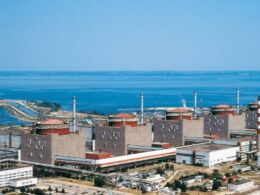The Office of Foreign Assets Control (OFAC), a division of the U.S. Department of the Treasury, has imposed sanctions on Russia’s Gazprombank—a key institution linked to Gazprom and the Putin regime.
Gazprombank facilitates financial transactions from Russian gas exports, making it a crucial channel for Kremlin revenues. This sanctions initiative aims to reduce Russia’s income and further isolate its economy.”Gazprombank serves as a conduit for Russia to purchase military equipment for its war against Ukraine. The Russian government also uses Gazprombank to pay soldiers, including combat bonuses, as well as compensation to families of soldiers killed in Putin’s brutal war against Ukraine,” OFAC reported.
In addition to Gazprombank, sanctions were extended to its international subsidiaries, including GPB International in Luxembourg, GPB Financial Services Hong Kong, GPB Financial Services and GPB-DI Holdings Limited in Cyprus, Gazprombank Switzerland, and GPB Africa and Middle East Pty in South Africa. OFAC emphasized that the ultimate goal of sanctions is not punishment but fostering positive behavioral changes. As such, Gazprombank could eventually be listed as an “exception,” allowing it to freely operate financial flows again.
Announcing the latest round of sanctions, the U.S. Treasury warned foreign banks and companies that they risk facing American restrictions if they continue dealings with sanctioned Russian entities, particularly Gazprombank. The scope of American sanctions, which extends beyond Russia, has prompted Kremlin allies like Turkey to advocate for easing restrictions. Turkey, which seeks to bolster its position as a regional energy hub, opposes the isolation of Russia and has been lobbying to lift U.S. sanctions on Gazprombank to sustain profitable trade with Gazprom.
Turkish Energy Minister Alparslan Bayraktar expressed frustration with the latest U.S. decisions. “If sanctions [against Gazprombank] are not lifted, it will have very serious consequences for Turkey,” he stated, referencing exemptions granted to Iran under similar circumstances.Criticism of U.S. restrictions on Gazprombank also came from Budapest. Hungarian Foreign Minister Péter Szijjártó labeled the sanctions a “threat to energy security” but assured that Hungary would continue purchasing Russian gas, whether via Ukraine or Turkey.
OFAC regularly reviews its sanction lists and updates the “exceptional” entities. The next revisions are expected in spring 2025, prompting Kremlin lobbyists to intensify efforts to ease restrictions on Gazprombank. Recently, Turkish and Russian officials met in Ankara to discuss “alternative payment methods” to maintain business with Russia while mitigating risks of secondary sanctions and potential U.S. legal action. Reports indicate discussions about processing payments for Russian hydrocarbons through Sberbank, VTB Bank, or Alfa-Bank instead of Gazprombank. Additionally, Russia seeks to integrate cryptocurrency into its oil and gas trade. Evidence of this is found in Chainalysis’ latest geographic report, which highlights Russia’s legalization of crypto assets to develop a digital infrastructure. This measure enables Russia to sustain its exports of oil, gas, and other resources under sanctions.Gazprom and Gazprombank are likely to explore business operations using cryptocurrency-based settlements.
“Given the U.S., UK, and EU sanctions on Russian entities, it is clear that such operations will rely on the shadow economy. Payments for these supplies are carried out through shell companies and conversion platforms,” said Ukrainian researcher Tetiana Dmytrenko, Ph.D. in Economics and a consultant to the United Nations Office on Drugs and Crime in Vienna.
She noted that cryptocurrency is a common payment method in trade with sanctioned countries. Many of these operations involve firms from nations where the crypto market is unregulated. “This facilitates avoiding quick investigations and judicial proceedings by law enforcement and legal systems,” Dmytrenko explained.








